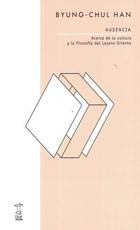
In his book "Shanzhai," Byung-Chul Han examined the notions of original and copy of China and the West, in a counterpoint that exhibited radically different structures of thought. Deepening the scope of this comparative task, this volume addresses an earlier and more fundamental contrast: while in the West, thought is always dominated by the figure of being and essence - Han discovers core of essentialist thinking even in the most sustained by leaving metaphysics behind, as in the case of Heidegger, Deleuze and Derrida-, in the Far East it is absence that prevails.
Through a fine analysis of oriental architecture, arts, language, food and gestures, Han gathers the cultural effects of this disagreement. The neither completely open nor completely closed specialty of the Buddhist temple, which denies the effect of interiority of Christian religious architecture; Oriental cuisine th...read more






